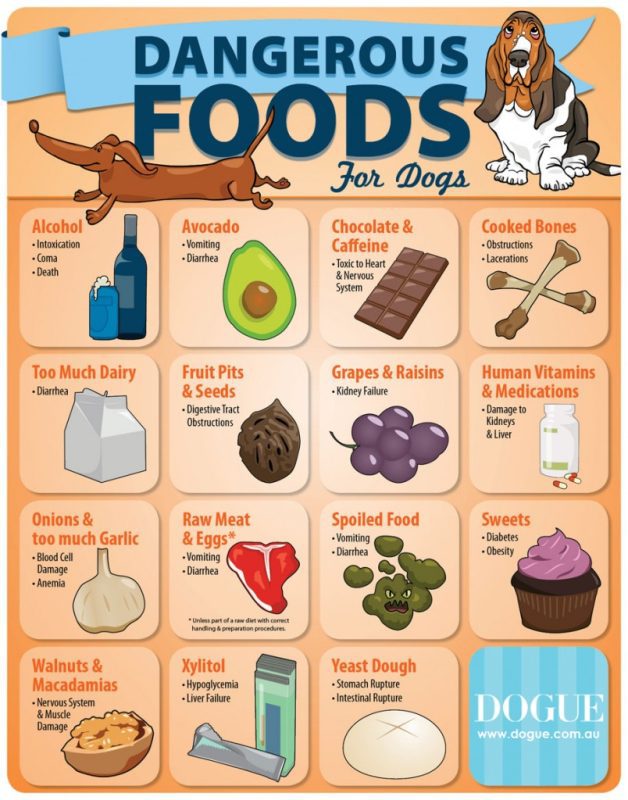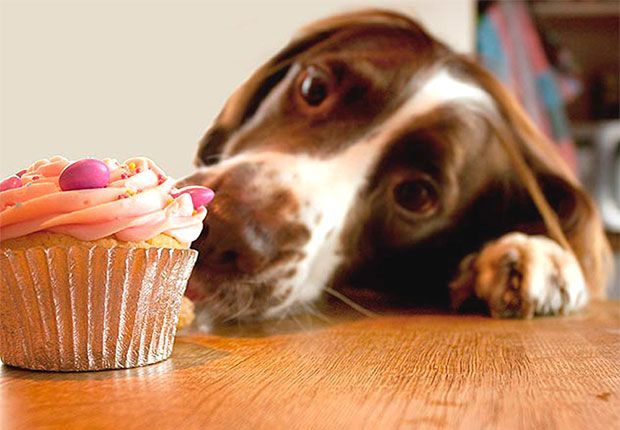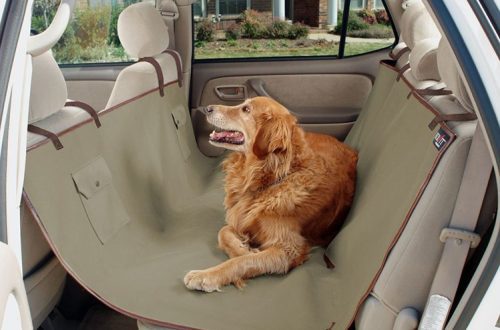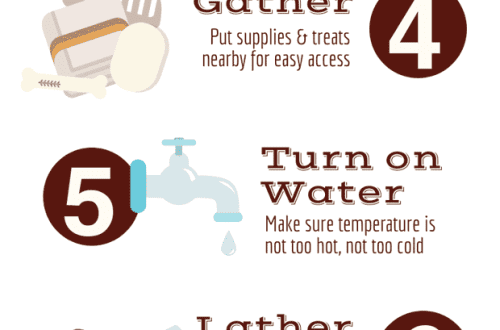
Foods that are dangerous for dogs

Dogs have long been important family members. They are loved and often pampered. People treat dogs, try to give them something tastier than usual food. And pets are happy, because it is much more pleasant to taste a piece of cheese or barbecue than ordinary daily food. This is where most of the health problems are hidden, because the dog begins to receive a lot of harmful snacks. We will tell you in more detail what is the greatest danger to dogs and why.
Contents
- What can not treat or feed the dog?
- Chocolate
- Sugar, caramel, cakes, cakes, meringues, pastries and other sweets
- Sugar substitute, chewing gum, sugar-free candy
- Tea and coffee
- Carbonated drinks
- Raisins and grapes
- mushrooms
- Avocado
- Peaches, plums, quince, cherries and cherries
- Alcohol
- Raw Seafood
- Sorrel and rhubarb
- Onion and garlic
- Raw white cabbage
- Broccoli
- Fatty, spicy, smoked, fried, salted and pickled foods
- spoiled food
- Boiled and tubular bones
- Food from the human table
- Contacting the clinic
What can not treat or feed the dog?
Chocolate
In certain doses, chocolate can be deadly to dogs because it contains theobromine. The amount of theobromine depends on the type of chocolate, with the highest amount found in bitter and dark chocolate, much less in milk chocolate, and virtually none or none at all in white chocolate. A dangerous dose are 7 gr. – this is 1-2 slices of dark chocolate per 1 kg. weight. White chocolate is practically harmless, but does not mean that it can be given to dogs – it contains a large amount of sugar.
A small amount of chocolate will probably only cause indigestion, vomiting and diarrhea. Larger amounts will cause an agitated hyperactive state, tremors, convulsions, rapid heart rate and breathing, and high blood pressure.
Sugar, caramel, cakes, cakes, meringues, pastries and other sweets
Sweet, especially in large quantities, is harmful not only to people. Fats, sugar, dyes and preservatives contained in sweets for humans can lead to indigestion in a dog, carbohydrate metabolism disorders, obesity, diabetes mellitus, diseases of the pancreas and liver, and badly affect the condition of the teeth. An allergic reaction is also very likely, accompanied by redness and itching of the skin, tearing, and sometimes otitis media. Sweet pastries, in addition to the content of harmful sugars and fast carbohydrates, pastries are harmful in that they cause fermentation processes in the intestines, flatulence develops.
Sugar substitute, chewing gum, sugar-free candy
Especially dangerous is xylitol (xylitol), which is used in the manufacture of chewing gum, candy, sugar-free ice cream, toothpaste and rinses, as well as a pure sugar substitute. Causes hypoglycemia, hypokalemia and toxic liver damage, sometimes collapse. Signs – vomiting, convulsions, loss of coordination, general depression.
Tea and coffee
These drinks contain caffeine. When consuming tea and coffee, the dog experiences overexcitation, irritability and anxiety, disorders of the cardiovascular system, rapid breathing, increased pressure, and digestive disorders. The action is very similar to chocolate poisoning.
Carbonated drinks
The composition includes dyes and preservatives, a large amount of sugar. A large amount of gas can cause belching, vomiting, increased gas formation in the intestines and associated colic, digestive disorders and liver and kidney function.
Raisins and grapes
Grapes and raisins contain a toxin that affects the dog’s kidneys, can cause kidney failure, as well as general depression, vomiting, diarrhea, and increased thirst.
mushrooms
For dogs, mushrooms are a heavy food that they are unable to digest and assimilate. In addition, mushrooms accumulate harmful substances in themselves, and can often contain toxins, causing severe poisoning, diarrhea, vomiting, and depression of the nervous system.
Nuts Coconut and pine nuts are considered the safest and can be given in very moderate amounts. Nuts that, when consumed by a dog more than 2-5 pieces, will cause indigestion, diarrhea and vomiting – almonds, pecans, Brazil nuts, peanuts, cashews, chestnuts. Nuts dangerous for a dog: walnuts and pistachios can lead to pancreatitis, macadamia and nutmeg – to tremors, paralysis of the limbs, severe pain in the abdomen, and sometimes even to coma and death, hazelnuts, especially with prolonged use – to stones in the bladder , and acorns, as well as leaves and oak bark – to kidney failure.
Avocado
Avocados contain the toxin persin, most of which is found in the pit and peel. Once in the body of a dog, it will cause intoxication, diarrhea and vomiting.
Peaches, plums, quince, cherries and cherries
Although these products contain a lot of vitamins, there is a danger to pets. Peaches, plums, and quince can cause digestive upset, vomiting, and diarrhea. A bone that enters the digestive tract can cause blockage or cyanide poisoning in a dog.
Alcohol
The ethanol contained in alcohol, and the breakdown product of ethanol, acetaldehyde, has a toxic effect on the dog’s body, which cannot break down these substances, causes dehydration, impaired kidney and liver function, tremors and convulsions, up to coma and death.
Raw Seafood
Shellfish and crustaceans are not recommended to be included in the dog’s diet in large quantities, especially if they are not thermally processed. Most often, this is fraught with digestive disorders and allergies. From seafood it is better to offer low-fat sea fish.
Sorrel and rhubarb
Do not include in your dog’s diet. Sorrel and rhubarb contain a lot of oxalic acid and oxalates (salts of oxalic acid), which negatively affects the dog’s urinary system.
Onion and garlic
They contain disulfides and sulfoxides, which cause anemia with prolonged use, but for this the dog must receive onions and garlic for a long time. When eaten on an empty stomach, they can irritate the lining of the stomach and intestines, leading to indigestion and abdominal pain.
Raw white cabbage
Promotes the occurrence of flatulence, bloating, pain and colic in the intestines.
Broccoli
The isocyanate found in broccoli is a toxin for dogs, causing severe stomach irritation, and in large quantities it can even cause death. The amount of broccoli in the total mass of vegetables should not exceed 5%. In a natural diet, broccoli can be added to a dog’s diet for variety, but not often in small amounts.
Fatty, spicy, smoked, fried, salted and pickled foods
Cause irritation of the stomach, intestines, can lead to diseases of the pancreas, gallbladder and bile ducts, liver , french fries, chips, nuggets.
Dysfunction of body systems does not always appear immediately. However, regular intake of these products by a dog can lead to severe electrolyte imbalance due to the high salt content and lead to diseases of the pancreas due to the fats contained. Cause irritation of the stomach, intestines, can lead to diseases of the pancreas, gallbladder and bile ducts, liver.
spoiled food
Spoiled food will cause indigestion, diarrhea and vomiting, and mold containing mycotoxins will lead to poisoning, hypersalivation, tremors and convulsions.
Boiled and tubular bones
The biggest danger is injury. Boiled and tubular bones easily break off, forming small sharp pieces and edges. Damage can begin already in the oral cavity: punctures, tooth fractures, scratches on the mucosa. Further, the bones can clog the digestive system in any area, scratch, mechanically damage, causing perforation of the walls and peritonitis, which can lead to the death of the animal.
At the same time, with natural nutrition, a dog can be given raw beef and veal knees, large mosses, chicken and turkey backs, necks, heads without beaks and paws without claws.
Food from the human table
Human food contains more salt than a dog needs, as well as spices, excess fats and carbohydrates, which are difficult for a dog to digest. In addition, it develops in the dog the bad habit of begging at the table or stealing food.
Contacting the clinic
Most likely, gastric lavage and giving enterosorbents will be required.
If you suspect poisoning, or if you clearly saw that the dog ate a prohibited product, it is better to immediately contact a veterinary clinic for help, as many poisonings require specific therapy.





